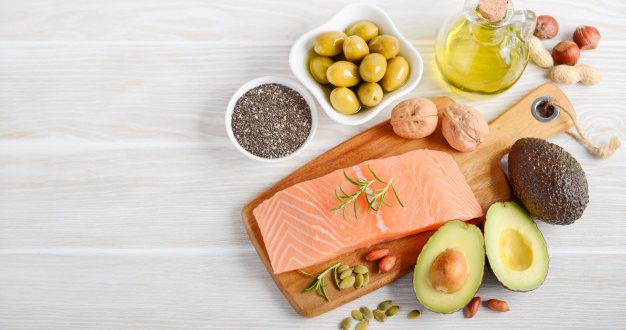By: Eileen Guo
Your body definitely needs fat. But how much? Consuming too much can lead to weight gain and, if consumed in excess, obesity. It can also increase your risk for heart disease. The amount you should consume each day depends on your calorie needs, which are based on your size and activity level. According to the U.S. Department of Agriculture, adult men need between 2,000 and 3,000 calories daily, while women require 1,600 to 2,400 calories daily to maintain a healthy weight. Talk to your doctor about the appropriate number of calories you need each day.
The four major fats in foods are saturated and trans fats (the bad ones) and monounsaturated and polyunsaturated fats (the “better” ones). Below you’ll find the 101 on each of these, including foods that commonly contain each of them, the effects they have on heart health and the amount of each you should incorporate into your diet each day.
Different fats have different characteristics and can also have various effects on heart health. Find the American Heart Association’s recommendations below:
The Bad Fats:
- Saturated fats can raise bad cholesterol levels and increase the risk of heart disease. Less than 7 percent of your daily calories should come from these. So if you eat 2,000 calories a day, for example, less than 140 calories (15 grams) can come from saturated fats.
Animal products: Beef, lamb, pork, poultry with the skin, beef fat, lard, cream, butter, cheese, other whole or reduced-fat dairy products
Some plants: Palm, and palm kernel and coconut oils
Baked goods: pastries, biscuits, muffins, cakes, pie crusts, doughnuts and cookies
Fried foods: French fries, fried chicken, breaded chicken nuggets and breaded fish
Snack foods: popcorn and crackers
Effect on heart health:
Are high in cholesterol
Raise bad cholesterol level
Increase risk of heart disease
The Skinny on Fats
The Better Fats
- Monounsaturated fats and polyunsaturated fats help reduce bad cholesterol and may lower your risk of heart disease. These should make up 25 to 35 percent of your total daily calorie intake. So, if you eat 2,000 calories a day, 500 to 700 calories should include monounsaturated and polyunsaturated fats.
- Polyunsaturated Fats are a type of dietary fat. Polyunsaturated fat is found in plant and animal foods, such as salmon, vegetable oils, and some nuts and seeds. “Unsaturated” refers to the fact that the molecules contain less than the maximum amount of hydrogen.
Vegetable oils: olive, canola, peanut, sesame, soybean, corn and safflower
Avocados and olives
Nuts and seeds: almonds and peanuts/peanut butter, walnuts and sunflower seeds
Fatty fish: salmon, tuna, mackerel, herring and trout
Effect on heart health:
Reduce bad cholesterol
May lower risk of heart disease
Daily Limit:
Total fats should comprise 25 to 35 percent of total daily calories
Eat foods with monounsaturated or polyunsaturated fats instead of saturated or trans fats
 Tempus Magazine By Students, For Students
Tempus Magazine By Students, For Students 



